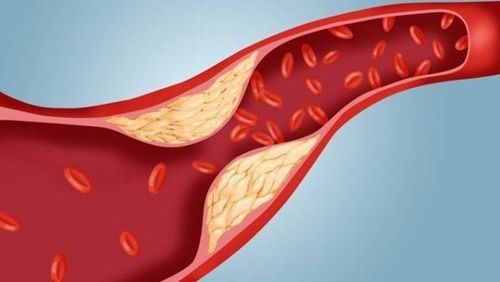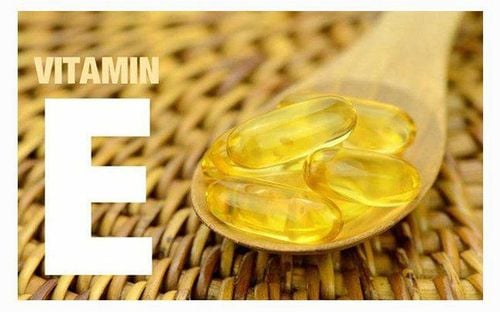This is an automatically translated article.
Lycopene is a phytonutrient with antioxidant properties. This is a pigment in fruit that gives red and pink colors, such as the characteristic colors of fruits like tomatoes, watermelons and pink grapefruits. Lycopene has been linked to cardiovascular health benefits, protecting the skin against sunburn and some types of cancer. This article looks at the health benefits and foods that contain lycopene.
1. Strong antioxidant properties
Lycopene is an antioxidant belonging to the carotene group. Lycopene is a major antioxidant that protects your body from damage caused by compounds called free radicals.When free radical levels rise excessively and exceed antioxidant levels, they can create oxidative stress in your body. This stress has been linked to an increase in several chronic diseases, such as cancer, diabetes, cardiovascular disease, and Alzheimer's.
Research shows that lycopene's antioxidant properties can help keep free radical levels in balance, protecting your body against some of these chronic conditions.
Additionally, test-tube and animal studies show that lycopene can protect your body from damage caused by pesticides, herbicides, monosodium glutamate (MSG), and some fungi.

Lycopene giúp chống lại oxy hóa hiệu quả
2. May Protect Against Certain Types of Cancer
Lycopene's strong antioxidant effects may prevent or slow the progression of some types of cancer. For example, test-tube studies suggest that this nutrient may slow the growth of breast and prostate cancer by limiting tumor growth.
Animal studies further report that it can prevent the growth of cancer cells in the kidney.
In humans, studies linking high levels of carotenoids, including lycopene, and a 32% and 50% lower risk of lung and prostate cancer, respectively.
A 23-year study in more than 46,000 men looked at the link between lycopene and prostate cancer more specifically. Men who consumed at least two servings of lycopene-rich ketchup per week had a 30% lower risk of prostate cancer than men who ate less than one serving of ketchup per month.
However, a recent review of 26 studies showed moderate results. The researchers identified a link between high lycopene intake and a 9 percent lower chance of developing prostate cancer. A daily intake of between 9 and 21 mg per day seems to be most beneficial.

Lycopene giúp làm chậm sự phát triển của ung thư vú
3. May Promote Heart Health
Lycopene may also help reduce the risk of developing or dying prematurely from cardiovascular disease. This may be because it can reduce cardiovascular disease risk factors. More specifically, lycopene can reduce levels of free radical damage, LDL and total cholesterol levels, and increase good HDL cholesterol.High blood levels of lycopene may also prolong life by a few years in patients with metabolic syndrome. This is a condition that can increase the risk and lead to cardiovascular diseases.
Over a 10-year period, researchers note that people with metabolic disorders who have high blood levels of lycopene have a 39% lower risk of premature death .
In another 10-year study, a nutrient-rich diet rich in lycopene was associated with a 17% to 26% lower risk of heart disease. A recent review linked high blood levels of lycopene to a 31% lower risk of stroke.
Lycopene's protective effects appear to be particularly beneficial for people with low blood levels of antioxidants or high levels of oxidative stress. This condition is more common in some older adults and people who smoke or have diabetes or cardiovascular disease.

Lycopene làm giảm sự tổn thương của cholesterol xấu đến cơ thể
4. Can protect skin against sunburn
Another effect of Lycopene is protection against sun damage. In a small 12-week study, participants were exposed to UV light before and after consuming 16 mg of lycopene from tomato paste or a placebo. Participants in the tomato group had less severe skin reactions to UV exposure than the placebo group.
In another 12-week study, taking 8 to 16 mg of lycopene daily, either from a daily food or supplement, reduced skin redness after UV exposure by 40% - 50%.
In this study, supplements containing a blend of lycopene and other carotenoids were more effective against UV damage than supplements containing lycopene alone.
This being said, lycopene's protective effects against UV damage are still limited and not considered a good substitute for sunscreen use.

Lycopene giúp chống lại các tia UV từ ánh nắng mặt trời
5. Other Potential Benefits
Lycopene may also provide a host of other health benefits - well-researched benefits include:May help improve your vision: Lycopene may prevent or delay the formation of cataracts crystals and reduce the risk of macular degeneration, the leading cause of blindness in older adults. May relieve pain: Lycopene may help relieve pain related to the nervous system, a type of pain caused by nerve and tissue damage. May protect your brain: Lycopene's antioxidant properties may help prevent seizures and memory loss in diseases associated with aging of the nervous system, such as Alzheimer's. May contribute to stronger bones: Lycopene's antioxidant effects may slow the death of bone cells, strengthen bone structure, and make bones stronger. To date, most of these benefits have only been observed in test-tube and animal studies. More studies in humans are needed before scientists can make strong recommendations about the effects of lycopene.

Lycopene giúp cải thiện thị lực hiệu quả
6. Top Food Sources of Lycopene
All foods that are naturally pink to red in color usually contain high amounts of lycopene.Tomatoes are the most lycopene-rich food source, especially ripe tomatoes, the more lycopene it contains. But you can also find this nutrient in a variety of other foods.
Here is a list of foods with the most lycopene per 100g of fruit:
Dried tomatoes: 45.9 mg Tomato sauce: 21.8 mg Guava: 5.2 mg Watermelon : 4.5 mg Fresh tomatoes: 3.0 mg Canned tomatoes: 2.7 mg Papaya: 1.8 mg Pink grapefruit: 1.1 mg Cooked red pepper: 0.5 mg There is currently no recommended daily intake for lycopene. However, from current studies, using 8 to 21 mg per day appears to be most beneficial.

Hàm lượng Lycopene có trong cà chua rất lớn
7. Lycopene Supplements
Although lycopene is found in many foods, you can also take it in supplement form (functional food).
However, when taken as a supplement, lycopene can interact with certain medications, including anticoagulants and blood pressure medications.
One small study also found that 2 mg of a lycopene supplement daily during pregnancy may increase the risk of preterm birth or low birth weight.
As another side note, some studies report that the beneficial effects of nutrients are more effective when obtained from food than from supplements.
8. Possible risks when using lycopene
Lycopene is generally considered safe, especially when it is obtained from food. In rare cases, eating high amounts of foods rich in lycopene can lead to a skin color change known as lycopenodermia.
However, this condition is rare because it is often difficult to achieve harmful concentrations through diet alone.
In one case report, this condition occurred in a man who drank 34 ounces (2 liters) of tomato juice daily for several years. Skin discoloration can be reversed after rebalancing the lycopene-free diet for a few weeks.

Bổ sung quá nhiều Lycopene sẽ khiến da đổi màu
Lycopene supplements may not be suitable for pregnant women and those taking certain medications. In a nutshell, Lycopene is a powerful antioxidant with many health benefits, including protecting skin against sun damage, improving heart health, and reducing the risk of certain types of cancer. . Although lycopene can be found as a supplement, it may be most effective when consumed from foods rich in lycopene such as tomatoes and other red or pink fruits.
Please dial HOTLINE for more information or register for an appointment HERE. Download MyVinmec app to make appointments faster and to manage your bookings easily.
Articles refer to the source: healthline.com













